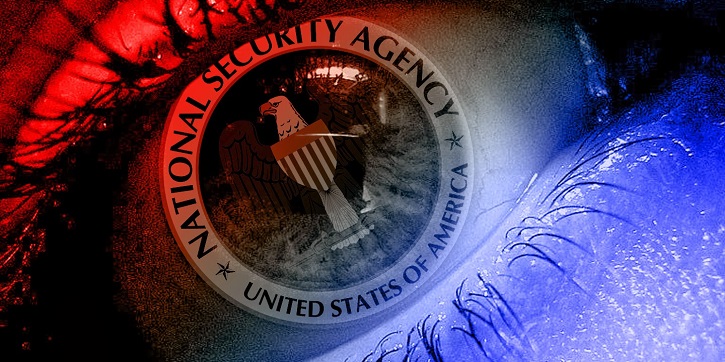The controversial section 215 of the Patriot Act which has allowed mass collection of American's phone call metadata is set for reform or expiry by the first of June, does it really matter?
The United States Court of Appeals for the Second Circuit ruled on Thursday that the bulk collection of Americans’ phone metadata by the NSA was NOT in fact authorized by section 215 of the Patriot Act, despite surveillance supporters' claims to the contrary.
“We hold that the text of [section § 215 of the Patriot Act] cannot bear the weight the government asks us to assign to it, and that it does not authorize the telephone metadata program.”
The ruling continues, “We do so comfortably in the full understanding that if Congress chooses to authorize such a far-reaching and unprecedented program, it has every opportunity to do so, and to do so unambiguously. Until such time as it does so, however, we decline to deviate from widely accepted interpretations of well‐established legal standards.”
The judges, while assertive in their condemnation of the Patriot Act as sufficient legal justification for the metadata program, carefully evaded criticisms of the program as a violation of the Fourth Amendment of the Constitution.

The Plot Thickens
The ruling comes a few weeks before the controversial section 215 of the Patriot Act is set to expire on June 1. Section 215 is essential in providing legal justification for the mass surveillance of American’s phone call metadata, including details about whom you call, when, from where, etc. — all except the content of conversations itself — provide enough information to establish your social status, alliances, core relationships, interests and more.
During the next few weeks, the fate of the Patriot Act will be debated and determined by the Senate as the deadline closes. A bipartisan Congress is mostly supportive of reform, in what the NY Times has called a “highly unusual alliance of House Speaker John A. Boehner, the White House, the Tea Party and a bipartisan majority in the House.”
In addition, two Republican presidential candidates in the Senate — Ted Cruz of Texas and Rand Paul — have made it clear they will not accept a straight extension of the current Patriot Act.
However, they are not without opposition. Senate Majority Leader Mitch McConnell introduced a bill in mid April that would reauthorize a controversial surveillance authority of the Patriot Act until 2020, without reform to section 215.
McConnell, his Intelligence Committee chairman, and a small group of defense hawks are the minority on this issue, though according to the NY Times, McConnell “holds powerful levers as the Senate leader that could halt the momentum or eventually alter the legislation.”
Thus democracy stands to be tested again, as if it hasn't failed enough.
'Because Terrorism'
The Patriot Act and almost every government overreach in privacy, property rights and expansion of military might at home and overseas has been built on top of the fear of “terrorists attacks,” particularly since 9/11. The surveillance of American's metadata is no different. McConnell, along with other surveillance supporters, justifies the programs with the two ubiquitous and propagandistic magic words that have been repeated for over a decade: “national security.”
One of the earliest and most impactful criticisms of the “national security” narrative came from a group of researchers appointed by President Barack Obama soon after the Snowden leaks in 2013 to evaluate the effectiveness of the NSA's surveillance over the phone call metadata of Americans. In their report, the panel of experts claimed that:
“[The] N.S.A. believes that on at least a few occasions, information derived [had] contributed to its efforts to prevent possible terrorist attacks, either in the United States or somewhere else in the world.”
But the panel concluded that the information collected under the program “was not essential to preventing attacks and could readily have been obtained in a timely manner using conventional” court orders, instead of the secretive and vague FISA (Foreign Intelligence Surveillance Act) court orders often called “rubber stamp.”
Surveillance program supporters from the intelligence community argued that mass surveillance locally and overseas has helped stop over 50 terrorist attacks in over 20 countries.
Yet during testimony published on March 2014 by the European Parliament's Committee on Civil Liberties, Justice and Home Affairs, Snowden told lawmakers that government officials had failed to provide evidence of the effectiveness of mass surveillance in stopping terrorism, — and worse, that government surveillance was a distraction.
Snowden wrote:
“The first principle any inquiry must take into account is that despite extraordinary political pressure to do so, no western government has been able to present evidence showing that such programs are necessary. In the United States, the heads of our spying services once claimed that 54 terrorist attacks had been stopped by mass surveillance, but two independent White House reviews with access to the classified evidence on which this claim was founded concluded it was untrue, as did a Federal Court.
“Looking at the US government's reports here is valuable. The most recent of these investigations, performed by the White House's Privacy and Civil Liberties Oversight Board, determined that the mass surveillance program investigated was not only ineffective — they found it had never stopped even a single imminent terrorist attack — but that it had no basis in law.”
“The White House's Privacy and Civil Liberties Oversight Board also established following 911, concluded: "we have not identified a single instance involving a threat to the United States in which the program made a concrete difference in the outcome of a counterterrorism investigation."
As far as the legality of the programs, the board noted, "There are four grounds upon which we find that the telephone records program fails to comply with Section 215, [that] the program violates the Electronic Communications Privacy Act" and that "The NSA’s telephone records program also raises concerns under both the First and Fourth Amendments to the United States Constitution."
The White House's response? House press secretary Jay Carney said members of the administration "simply disagree with the board's analysis on the legality of the program," without addressing the lack of evidence over the effectiveness of the programs, as reported by The Hill.
In regards to the legality of these programs, Snowden added:
“One of the foremost activities of the NSA's FAD, or Foreign Affairs Division, is to pressure or incentivize EU member states to change their laws to enable mass surveillance. Lawyers from the NSA, as well as the UK's GCHQ, work very hard to search for loopholes in laws and constitutional protections that they can use to justify indiscriminate, dragnet surveillance operations that were at best unwittingly authorized by lawmakers.
These efforts to interpret new powers out of vague laws is an intentional strategy to avoid public opposition and lawmakers’ insistence that legal limits be respected, effects the GCHQ internally described in its own documents as ‘damaging public debate.’”

Reform or No Reform, Does It Matter?
While reform of the Patriot Act's section 215 would indeed count as a small victory, it would be too small to effectively keep American's and everyone else's privacy intact. This whole debacle may appease the rightful anger of Americans and the world, but it won’t end surveillance over them. As the NY Times puts it:
“The legislation would still leave an expansive surveillance apparatus capable of tracking vast quantities of data. Some of the most sweeping programs disclosed by Mr. Snowden, particularly those focused on international communications, would remain unaffected. The N.S.A. could continue efforts to break private encryption systems, and information about Americans could still be swept up if originating overseas.”
Dan Froomkin of The Intercept clarified which of the many surveillance programs would continue:
- Tapping data lines that go in and out of the U.S., grabbing personal information without a warrant from major content providers like Facebook and Yahoo — no worries.
- Sweeping up all non-U.S. content possible — sometimes an entire country’s phone calls at a time. Breaking encryption. Installing malware. Hacking Sim cards. Tracking cellphones. No problem.
- Spying on porn habits. Sharing raw intelligence on Americans with Israel. It happens.
- Installing shunts on the fiber optic cables that are the backbone of the Internet. Breaking into cell networks. Tapping private links between data centers. S’alright.
- Allowing secret laws developed on the fly by a rubber-stamp secret court that the Intelligence Community still doesn’t level with. Spy chiefs who want to “collect it all.” Cost of doing business.
- Extraordinary new abilities — like automated transcription of phone calls — that Congress never anticipated, may not even know about, and certainly never establish rules for. Love it or leave it, baby.
What Now?
We can keep building encrypted communications services, as Snowden has suggested, making them similar to, if not better than, those the NSA has complained about. In particular, we can keep focusing on blockchain-powered technologies that require no trust in a third party that may be bent by the addictive lure of power.
Peer-to-peer encrypted voice over IP and other communication services, for example, may provide a privacy opportunity for Americans, in particular. According to a Senior Intelligence Official, “Telecoms don’t want to [end surveillance programs]. … They want to be compelled, and they want to be paid for the service.” Such a claim should not pass unquestioned, but at face value it seems to make sense, given that Facebook and Google's business model is indeed to sell your data to the highest bidder.
Oh yeah, and take advantage of the technologies already available that can seriously improve your privacy, such as these three privacy companies, and this email provider.

